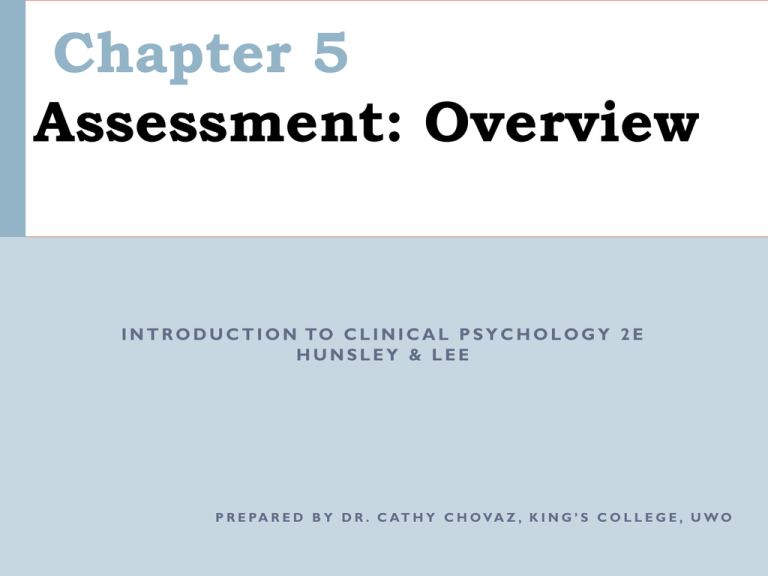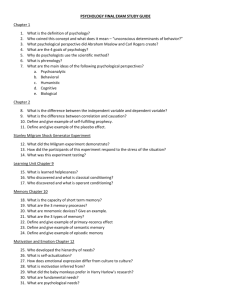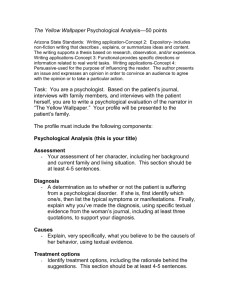
Chapter 5
Assessment: Overview
I N T R O D U C T I O N TO C L I N I C A L P S Y C H O L O G Y 2 E
HUNSLEY & LEE
P R E P A R E D B Y D R . C AT H Y C H O V A Z , K I N G ’ S C O L L E G E , U W O
Assessment – Topics
Psychological Assessment
Competencies in Psychological Assessment
Assessment Focused
Intervention Focused
Additional Assessment Types
Psychological Testing
Psychological Assessment
An iterative process
Systematic
Information about the person’s physical, social, and
cultural environments
Refining the question at hand before responding to a
question or a goal of the assessment
Psychological Assessment
Generating and refining hypotheses
Importance of being informed about human diversity
Age
Gender
Sexual orientation
Culture
Religious beliefs
Competencies in
Psychological Assessment
Knowledge of:
psychometric theory
the scientific, theoretical, empirical, and contextual bases of
assessment
Knowledge, skills, and techniques to assess:
cognitive
affective
behavioral
personality
Competencies in
Psychological Assessment
Ability to:
assess intervention outcomes
evaluate multiple roles that clients and psychologists function
Understanding of the relation between assessment
and intervention and intervention planning
Technical assessment skills, including problem/goal
identification and case conceptualization
Assessment Focused
Assessment-focused services:
Information provided that addresses a person’s current or
anticipated psychosocial deficits
For example, child custody evaluations
Intervention Focused
Intervention-focused services:
The first step in gathering information about appropriate
treatment
For example, intake evaluation at a clinic
Additional Assessment Types
Screening: A tool often developed to identify a disorder,
condition or characteristic, depending on the site
For example, a measure that identifies mental health problems in
adolescents
Diagnosis/Case Formulation: The development of an
understanding of the basis/etiology of the problem that
informs treatment
For example, early stages of therapy
Additional Assessment Types
Prognosis/Prediction: An assessment used to see
whether a problem will worsen without treatment
Whether one needs therapy for a given problem
Prediction errors – unfortunately common in clinical
psychology
Base rate – frequency of a problem in the general population
Additional Assessment Types
Prognosis/Prediction (cont):
Sensitivity
– the number of times an event is predicted compared
to the actual number of events
Specificity – the number of times a non-event is predicted
compared to the actual number of non-events
Prediction
Event
Non-Event
True Event
True Non-Event
True Positives (A)
False Positives (B)
False Negatives (C) True Negatives (D)
Sensitivity: A / (A + C)
Specificity: D / (D + B)
Example
A Psychologist who conducts assessments to
determine who is at risk for future suicide attempts
Sensitivity – provides information on how well the
assessment procedures are able to detect future suicide
attempts
Specificity – provides information on how well the
assessment procedures were able to identify individuals
who would not attempt suicide
Ideal - ↑specificity and ↑sensitivity
Treatment
1. Planning
Great deal of assessment is designed to inform
treatment-related decisions
Useful treatment plan:
1. Problem Identification
2. Treatment Goals
3. Treatment Strategies
Treatment (cont.)
2. Monitoring
Psychologist must closely monitor the impact of Tx
Enables treatment plans to change to better meet the
patient’s needs (i.e., shortened, lengthened, intensified)
How is it monitored?
Interviews
Brief psychological tests
Specific tests designed for goals
Treatment (cont.)
1.
Evaluation
Outcome data is typically collected to document the
extent to which psychological treatment has been
effective in achieving stated goals
May also be used to evaluate an entire service or
individual clinicians
Also yields much more data on the effects on clients,
strengths and weaknesses of the strategy, etc.
Psychological Testing
Psychological testing:
A sample of a person’s behavior scored in a standardized
process
Not the same as psychological assessment (which is often more
multi-faceted and may not use tests per se)
Psychological Testing:
Important Concepts
Standardization:
Consistency across clinicians in the procedure used to
administer and score a test
Reliability:
A measure of the consistency of the test
Internal consistency: whether all aspects of the test contribute
meaningfully
Test-retest reliability: whether similar results would be
obtained at 2 time points
Inter-rater reliability: whether similar results would be found
by several raters
Psychological Testing:
Important Concepts
Validity:
Whether a test measures what it is supposed to measure
Content validity: whether the test measures all aspects of the
construct
Concurrent and predictive validity: whether the test data
are consistent with other related constructs
Discriminant validity: whether the test is not measuring
unrelated constructs
Incremental validity: whether the measure adds to other
sources of data
Psychological Testing:
Important Concepts
Norms:
Using a large sample to determine cut off scores on a test
Representative sample: importance of using a sample that
matches the population
Percentile rank: percentage of those in the normative group
that fell below a given test score
Evidence-based assessment: using theory and research
to guide the process of assessment
Copyright
Copyright © 2010 John Wiley & Sons Canada, Ltd. All rights reserved.
Reproduction or translation of this work beyond that permitted by Access
Copyright (The Canadian Copyright Licensing Agency) is unlawful. Requests
for further information should be addressed to the Permissions Department,
John Wiley & Sons Canada, Ltd. The purchaser may make back-up copies for
his or her own use only and not for distribution or resale. The author and
the publisher assume no responsibility for errors, omissions, or damages
caused by the use of these programs or from the use of the information
contained herein.




